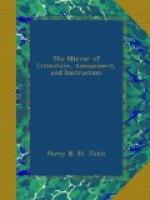[Illustration: Queen Anne’s Spring, near Eton.]
(From a Correspondent.)
The accompanying sketch represents a sequestered spot of sylvan shade whence rises a Spring which tradition designates Queen Anne’s. Here the limpid crystal flows in gentle, yet ceaseless streams, conveying “Health to the sick and solace to the swain.”
It has some claims to antiquity; and its merits have been appreciated by royalty. Queen Anne was the first august personage who had recourse to it; in later times, Queen Charlotte for many years had the pure element conveyed to her royal abode at Windsor, and in 1785, a stone, with a cipher and date, was placed there by her illustrious consort, George III. This spring is situate at Chalvey, (a village between Eton and Salt Hill,) on the property of J. Mason, Esq., Cippenham. It was the observation of the esteemed and celebrated Dr. Heberdeen, that it but required a physician to write a treatise on the water, to render it as efficacious as Malvern.
URANIA.
* * * * *
Spirit Of The Public Journals.
* * * * *
STATE OF MAGIC IN EGYPT, BY AN EYE-WITNESS.
At the Consul General’s table, in Egypt, in August, 1822, the conversation turned on the belief in magic; and the Consul’s Italian Staff propounded the following story, which seemed to have perfect possession of their best belief. They said that a magician of great name was then in Cairo—I think a Mogrebine; and that he had been sent for to the Consul’s house, and put to the following proof:—A silver spoon had been lost, and he was invited to point out the thief. On arriving, he sent for an Arab boy at hazard out of the street, and after various ceremonies, poured ink into the boy’s hand, into which the boy was to look. It was stated, that he asked the boy what he saw, and the boy answered, “I see a little man,”—Tell him to bring a flag,—“Now he has brought a flag.”—Tell him to bring another.—“Now he has brought another.”—Tell him to bring a third,—“Now he has brought it.”—Tell him to bring a fourth.—“He has brought it.”—Tell him to bring the captain of them all.—“I see a great Sheik on horseback.”—Tell him to bring the man that stole the spoon.—“Now he has brought him.”—What is he like?—“He is a Frangi, poor-looking and mesquin.” After which followed other points of personal description not remembered; but which drew from the Staff the observation, that a European of exactly those qualities had been about the house. We expressed our desire to be introduced to the magician, and the Consul gravely intimated it might hurt the prejudices of his wife, as being a Catholic; to the great mirth of the beautiful Consuless when she was told of it, who, though a Catholic and an Italian, declared she was the only person in the family that set all the magicians in Egypt at defiance.




